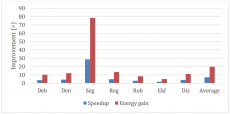Continuing the Scaling of Digital Computing Post Moore’s Law

Speedup and energy improvement (in multiplication factors) of specialized architectures for medical imaging. Specialized architectures were implemented in a FPGA and compared against a 12-core Intel Xeon E5 CMP.
The approaching end of traditional CMOS technology scaling that up until now followed Moore's law is coming to an end in the next decade. However, the DOE has come to depend on the rapid, predictable, and cheap scaling of computing performance to meet mission needs for scientific theory, large scale experiments, and national security. Moving forward, performance scaling of digital computing will need to originate from energy and cost reductions that are a result of novel architectures, devices, manufacturing technologies, and programming models. The deeper issue presented by these changes is the threat to DOE’s mission and to the future economic growth of the U.S. computing industry and to society as a whole. With the impending end of Moore’s law, it is imperative for the Office of Advanced Scientific Computing Research (ASCR) to develop a balanced research agenda to assess the viability of novel semiconductor technologies and navigate the ensuing challenges. This report identifies four areas and research directions for ASCR and how each can be used to preserve performance scaling of digital computing beyond exascale and after Moore's law ends.
Project Participants
About Berkeley Lab
Founded in 1931 on the belief that the biggest scientific challenges are best addressed by teams, Lawrence Berkeley National Laboratory and its scientists have been recognized with 16 Nobel Prizes. Today, Berkeley Lab researchers develop sustainable energy and environmental solutions, create useful new materials, advance the frontiers of computing, and probe the mysteries of life, matter, and the universe. Scientists from around the world rely on the Lab’s facilities for their own discovery science. Berkeley Lab is a multiprogram national laboratory, managed by the University of California for the U.S. Department of Energy’s Office of Science.
DOE’s Office of Science is the single largest supporter of basic research in the physical sciences in the United States, and is working to address some of the most pressing challenges of our time. For more information, please visit energy.gov/science.









